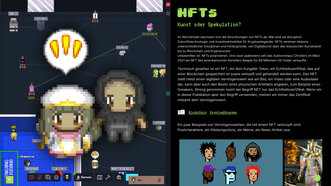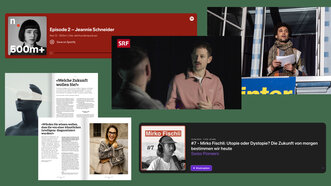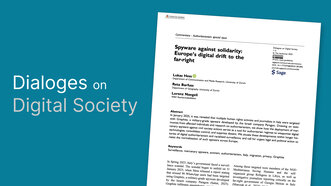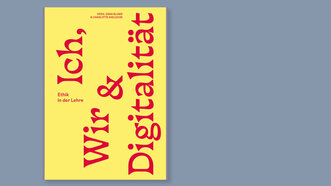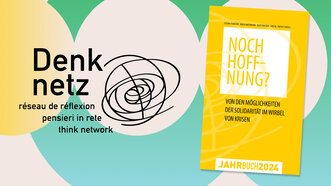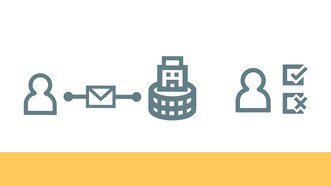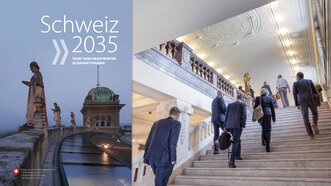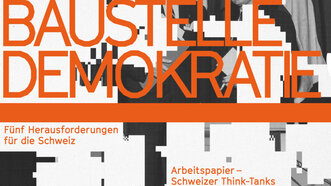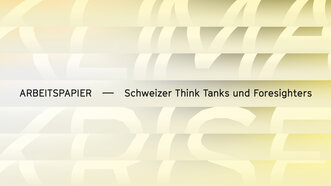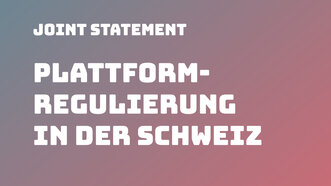Publications
Our publications offer well-founded commentaries, a basis for discussion and solutions for current challenges.
TA-SWISS
NFTs in the Art World - a Discourse Analysis
The interactive publication ‘Proof of Culture’ is dedicated to the discourse surrounding NFTs in the art world. It brings together 14 voices from the fields of art and blockchain and categorises them. At this point, NFTs serve as an example of the heated discussions on the assessment of so-called ‘emerging technologies’: New technologies that promise to significantly improve existing processes.
Case StudyDivers
Various articles & publications
Whether through its own publications or as a voice in the media and specialist articles, Dezentrum shapes discourse on digital transformation, democracy and social change. In this collection, we show where our perspectives are already having an impact: from interviews and essays to guest contributions.
Case StudyCommentary in Dialogues on Digital Society Journal
Spyware against Solidarity
Together with Reta Barfuss (University of Zurich) and Lorenz Nägeli (WAV), Dezentrum partner Lukas Hess has written an article for the Dialogues on Digital Society Journal about how hyper-invasive surveillance technologies are becoming normalized in Europe — and why this concerns us all.
Case StudyApéro Digital IV
Speculative newspaper «Algorithm Resistance»
A speculative newspaper about the influence of algorithms on democracy and deliberation. All levels of society are challenged: We need citizen empowerment at the personal level, technological solutions that are an alternative to the big technology platforms, and coherent policy-making at the political level.
Case Studywith Republik und WAV
Do not feed the Google
A journalistic research on Google and Google's role in Switzerland. In collaboration with the online news magazine Republik and the research collective WAV
Case StudyHouse of electronic Arts, Christoph Merian Verlag
no1s1 in «Algorithmic Imaginary»
In 2023, no1s1 – a house that belongs to nobody – was part of the exhibition «Exploring the Decentralized Web – Art on the Blockchain» in the House of electronic Arts in Basel. The corresponding publication was published by Christoph Merian Verlag.
Case StudyZHdK
Article «Justice & participation in the digital world»
An article on the effects of digital transformation and the need for an inclusive discourse in the publication «Ich, Wir & Digitalität. Ethik in der Lehre» («Me, Us and Digitality. Ethics in Teaching»).
Case StudyDenknetz
Guest Article: Beyond Efficiency - New Work thought differently
In her article for the Denknetz yearbook, Dezentrum partner Jeannie Schneider sheds light on the extent to which the digital revolution is changing the promise of increased efficiency with the use of ChatGPT and other large language models. As part of this development, she sheds light on the New Work approach: a buzzword that promises transformation through new technological possibilities and is intended to adapt working models to changing values.
Hier geht es zum Artikel
Case StudyRaiffeisen
Digital participation for the Raiffeisen Cooperative Banks
Digital technologies enable participation that goes beyond the bratwurst at the neighbourhood festival. We have initiated this process at Raiffeisen and report on it here.
Case StudyWhitepaper eParticipation
Opportunities and applications of eParticipation in cooperatives
For Idée Coopérative, Dezentrum has published a white paper on the topic of eParticipation in cooperatives. The report does not only highlight the importance of eParticipation, it also illustrates concrete examples of application as well as opportunities digitalised participation brings along.
Download WhitepaperFederal Chancellery
Situation and context analysis Cash for the Federal Chancellery
Every four years, the Federal Chancellery publishes a situation and context analysis to provide the Federal Council with a foundation for its long-term planning. On behalf of the Federal Chancellery, the Dezentrum has answered the question if we will still be paying with banknotes in 2035.
Case StudySwiss think tanks
Democracy building site
Democracy cannot be taken for granted. In a joint working paper with five other think tanks, we identified challenges for Swiss democracy and how these can be tackled.
Case StudySwiss Think Tanks
20 ways to overcome the climate crisis
Together with nine other leading Swiss think tanks, we have outlined different ways of dealing with the climate crisis in a working paper.
Case StudyAlliance Digitale
Joint Statement for More Democracy on Large Platforms
A coalition from civil society is proposing ten measures to enforce fundamental rights, rule of law principles and democratic control in the digital public sphere. In a joint statement, we call for Switzerland to finally tackle the regulation of online platforms.
Case StudyRIAT Institute
Do we need a digital legal entity?
Should software-based actors, i.e., entities or systems that are primarily controlled by software, be granted person status? We wrote an essay on this question for the magazine «Future Cryptoeconomic». It was later also printed in the factory newspaper of the Rote Fabrik.
Read MoreOffers
We support organisations with research, sensitisation, consulting and active collaboration in digitisation projects. We break through silos and bring together experts from science, design, business and technology.


